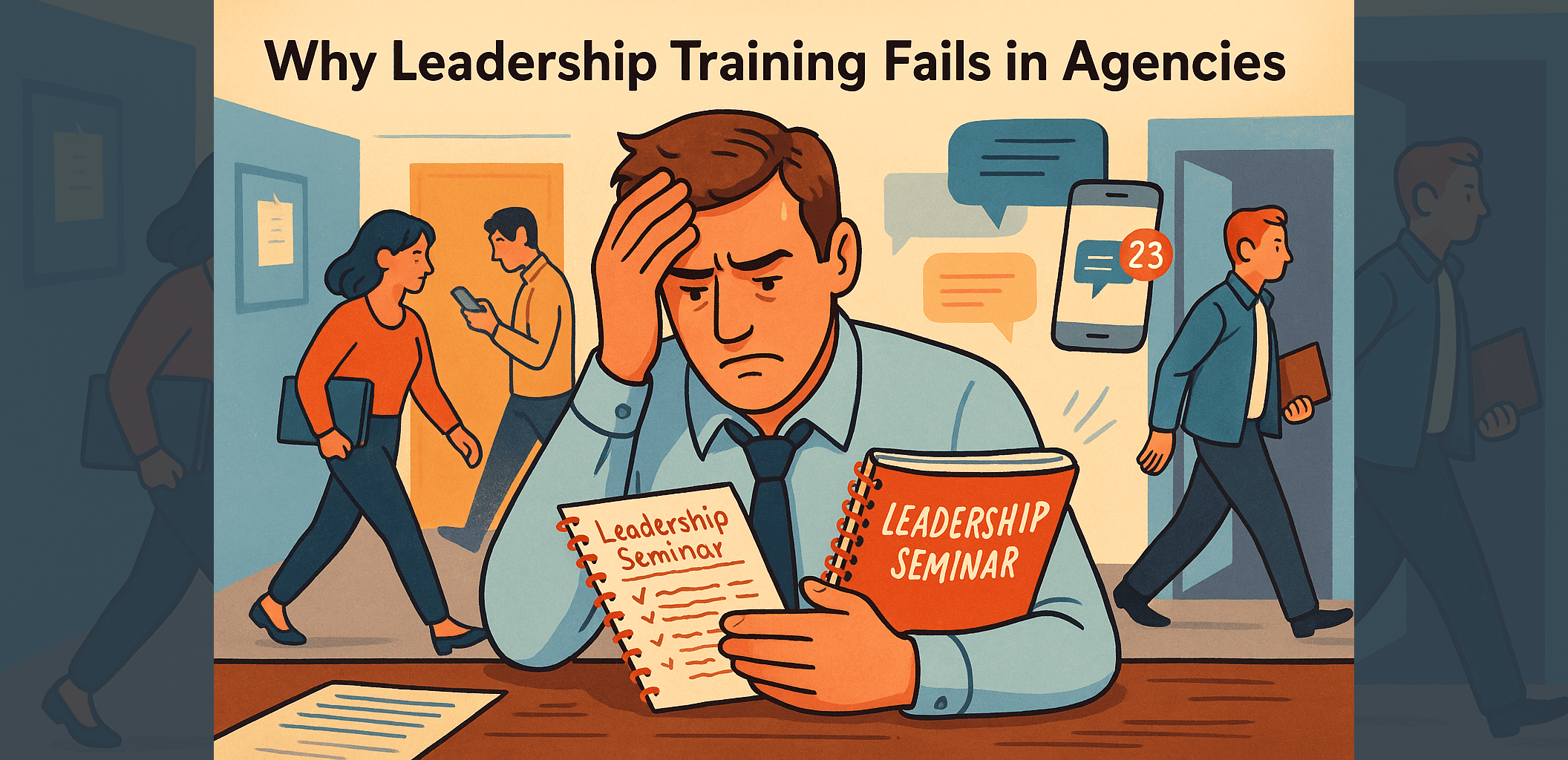Why Leadership Training Fails in Agencies

Every agency boss knows leadership matters. That’s why training programs, seminars, and workshops for team leaders have become an industry staple. Yet, despite all the investment, most agencies face the same problem: leaders who shine in training but collapse in practice.
Why does leadership training so often fall flat in real estate agencies? The reasons lie not in the classroom—but in the structure and culture of the business itself.
1. Leadership Without Real Authority
Most team leaders in agencies don’t actually control resources, pay, or career paths. They can rally agents, but they can’t enforce standards. Without authority over commission splits, leads, or admin support, “leadership” is reduced to motivational speeches and WhatsApp pep talks.
Training tells them to inspire. The reality forces them to beg.
2. Motivation Doesn’t Replace Systems
Workshops teach emotional intelligence, communication, and vision-casting. But none of that matters if the agency runs on WhatsApp chaos, Excel sheets, and verbal promises.
Leaders fail not because they’re untrained, but because they’re unsupported. Without proper ERPs, transparent commission systems, and structured co-broking rules, leaders can’t scale discipline or trust.
Motivation fades. Systems endure.
3. Short-Term Mindset vs. Long-Term Growth
Many bosses send leaders to training as a quick fix: “Learn leadership and my team will perform better.” But in an industry where most agents switch firms within 6–18 months, the incentive is short-term closings, not long-term culture.
This churn makes leadership a futile exercise in rebuilding instead of refining, costing the agency in lost listings, recruitment fees, and perpetual onboarding.
4. Promoting Salespeople, Not Leaders
Many bosses promote top agents into leadership roles, rewarding sales volume over leadership potential. But the skills that close deals—ego, persistence, self-focus—often clash with the skills that build teams—empathy, patience, process.
This structural mistake puts ego where empathy is needed, setting everyone up for failure.
5. Lack of a Clear Vision or "Why"
Training seminars often teach generic leadership principles, but they rarely tie these principles to the specific vision or mission of the agency itself. A leader needs to know what they’re leading toward. If the agency’s goals are vague or constantly shifting, leaders can’t align their team’s efforts—no matter how good their communication skills are.
Without a clear “why,” leadership training becomes theory with no anchor.
6. No Post-Training Reinforcement or Mentorship
Training isn’t a one-time event; it’s a process. Agencies often spend thousands on workshops, but when leaders return to the office, there’s no mentor or system to help them apply what they’ve learned.
Without reinforcement, follow-up, or an environment where new skills can be practiced, the lessons fade within weeks. Real leadership development requires ongoing support and accountability.
7. The "Lone Wolf" Culture
The real estate industry often glorifies the superstar negotiator—the lone closer who outshines everyone else. This creates a culture where collaboration, mentorship, and team building are secondary to individual sales.
A team leader tasked with building cohesion is often fighting against an entrenched culture of self-interest and silos. You can train leaders, but if the culture rewards lone wolves, teamwork will always lose.
8. The Financial Model Discourages True Mentorship
In a commission-based industry, time is literally money. Every hour a team leader spends coaching a new agent or resolving an internal conflict is an hour they’re not spending on their own high-value deals.
Unless the agency’s compensation structure explicitly and generously rewards leaders for their team’s success (beyond a token override), the financial incentive will always pull them back toward their personal pipeline, undermining the mentorship that training promotes.
9. Fear of Creating Competitors
This is the unspoken fear in many agency owners’ minds. Why invest deeply in developing a star leader who, once empowered and skilled, might leave to start their own rival agency and take the best agents with them?
This underlying fear leads to subconscious sabotage of leadership development. Agencies provide just enough training to improve performance but not enough genuine authority, transparency, or partnership to create a true leader—or a future competitor.
What Actually Works
Leadership development in agencies doesn’t fail because leadership is unteachable. It fails because training is misaligned with the business model and incentives. The fixes aren’t glamorous, but they work:
- Give real authority → leaders should control leads, commission overrides, and team budgets.
- Build systems, not slogans → ERP platforms, compliance processes, and transparent splits create environments where leaders can lead.
- Recruitment for leadership traits, not just closings → empathy, patience, and process orientation matter more than personal sales.
- Align incentives to retention → reward leaders for building teams that last, not just agents who close fast.
- Embed mentorship and clarity → provide ongoing coaching and tie leadership development to a clear agency mission.
Final Word
Leadership training in agencies often fails because it teaches theory while ignoring the deeper realities of structure, culture, and incentives. Without authority, systems, vision, reinforcement, fair rewards, and trust, leaders are set up to fail—no matter how inspiring the seminar.
👉 The solution isn’t a better leadership course. It’s building an agency where leadership is actually possible.











































































































